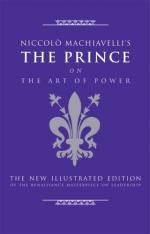|
This section contains 17,446 words (approx. 59 pages at 300 words per page) |

|
SOURCE: Flaumenhaft, Mera J. “The Comic Remedy in Private Spectacle: Machiavelli's Mandragola.” In The Civic Spectacle: Essays on Drama and Community, pp. 85–121. Lanham, MD: Rowman & Littlefield Publisher, 1994.
In the following essay, Flaumenhaft examines Machivelli's use of comedy in support of his idea of virtù.
In October 1525, Niccolò Machiavelli wrote to his friend Francesco Guicciardini to explain some difficult passages in the Mandragola—passages that had brought Guicciardini great “distress of mind.”1 In this letter, Machiavelli playfully clarifies a colloquial expression by commenting on a mysterious sonnet by a modern writer, Burchiello. Machiavelli says he believes that a person who considers the sonnet well “may continue to stir up our times.”2 He also refers to an ancient authority—“as Titus Livius says in his second decade”3—although he is aware that the second decade of Livy's Roman history is not extant. Perhaps his parody of a scholarly analysis of...
|
This section contains 17,446 words (approx. 59 pages at 300 words per page) |

|


